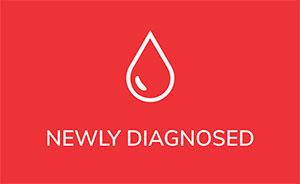Bruton’s tyrosine kinase (BTK) is a key signaling molecule involved in the survival of malignant B cells. Drugs that inhibit the action of BTK block the signals that allow malignant cells to grow uncontrollably. BTK inhibitors such as ibrutinib and acalabrutinib have revolutionized the treatment of chronic lymphocytic leukemia (CLL), but they don’t always work forever. Patients can develop mutations and relapse.
At the annual meeting of the American Society of Hematology (ASH) 2020, our own Dr. Brian Koffman interviewed Dr. Adrian Wiestner, a senior investigator at the National Institutes of Health who focuses on treating patients with chronic lymphocytic leukemia (CLL). They discussed how often BTK mutations occur in patients treated with ibrutinib.
Takeaways:
- In cells that develop a resistance to ibrutinib, there is a mutation in the part of the BTK molecule where ibrutinib normally binds. This means that ibrutinib is unable to bind to BTK and turn it off.
- Approximately 60-80% of patients whose disease has progressed on ibrutinib or acalabrutinib have acquired a mutation in BTK.
- Researchers wanted to know how common BTK mutations were in patients who were responding well to ibrutinib.
- In previously untreated patients, who received ibrutinib as a first-line treatment, BTK mutations were only found in 2-3% of patients.
- Even though a small fraction of patients had a mutation in BTK, they were still responding well to ibrutinib, meaning that just having the mutation does not mean that you will immediately stop responding to treatment.
- Some patients with a BTK mutation could go a year or more before developing clinical signs of progression.
- In patients with relapsed/refractory CLL (meaning that they had been previously treated and their disease had progressed), acquired BTK mutations were more common (~30%) but they were still able to respond to ibrutinib.
- When scientists detect BTK mutations, it usually means that only some of your cells have the mutation. It is almost never the case that the mutation is present in all of your cells.
- When patients have a BTK mutation but are still responding to ibrutinib, it may be that CLL cells with the BTK mutation are present, but they have not become the dominant cell type yet. Over time as CLL cells with the BTK mutation take over, patients may stop responding to ibrutinib.
- Based on this information, there is no reason to test for BTK mutations in routine clinical practice. Treatment plan decisions should still be made based on the clinical signs of progression.
Conclusions:
BTK mutations are rare in patients treated with first-line ibrutinib and more common in patients with relapsed/refractory CLL. Having a BTK mutation does not automatically mean that BTK inhibitors will not work, because only a portion of the CLL cells will have this mutation. Thus, ibrutinib and acalabrutinib can still be effective treatments for a period of time. Current consensus guidelines advise that the detection of BTK mutations does not currently warrant changes in the treatment of patients with CLL, and treatment decisions should still be made based on clinical signs of progression.
Please enjoy this brief interview with Dr. Wiestner from the virtual ASH meeting which was held December 2020.
You can read the actual abstract here: Rarity of B-Cell Receptor Pathway Mutations in Progression-Free Patients With Chronic Lymphocytic Leukemia (CLL) During First-Line Versus Relapsed/Refractory (R/R) Treatment With Ibrutinib
Take care of yourself first.
Ann Liu, PhD



